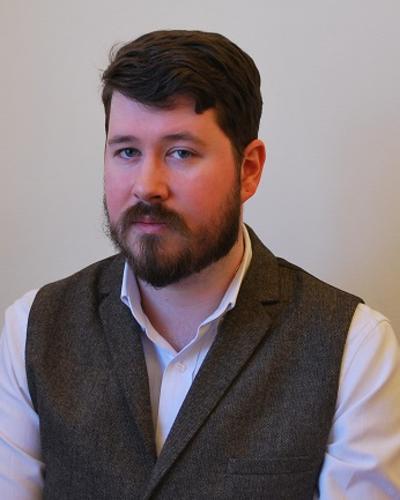AHKR-stipendiater godt i gang
Alle AHKRs fag var representerte da fem nye stipendiater startet ved instituttet våren 2019. Nå er de for lengst i gang med både forskning og undervisning. Les presentasjon av prosjektene deres her.

Hovedinnhold
Nick Pouls (history)
Patristic books have had a profound influence on the development of monastic intellectual history in the Middle Ages, as these texts play a crucial role in theological debates. By investigating the materiality of surviving patristic books from Benedictine and Cistercian abbeys dating to the eleventh and twelfth centuries, we are in a better position to assess to what extent this is the case. This dissertation will discuss three different data sets: 1) surviving patristic books discussed in the Catalogues des manuscrits datés, 2) all known patristic books written in Benedictine and Cistercian abbeys in the Low Countries dating to the ninth, tenth, eleventh and twelfth centuries, and 3) – as case study – copies of Gregory the Great’s Moralia in Iob attributed to the monastic institutions in the Low Countries. A comparison between the codicological and palaeographical traits allows to discuss the function of patristic books in a monastic institution. The dissertation will discuss the patterns regarding the materiality, provide examples of findings paying particular attention to unexpected variability, reflect on problems arising in the comparison, and discuss the implications of a comparative codicological and palaeographical method.
Supervisors are Leidulf Melve, Åslaug Ommundsen and Marco Mostert (Utrecht)
Joanna Spyra (history)
In her PhD project, Joanna wants to analyze the experience of Jewish women immigrants within the historical context of gender relations and sexuality in Argentina, in a specific time framework (1930s) and through the lens of different Jewish organizations and the state of Argentina. This study seeks to make a systematic examination of the understanding of the female psyche, body, and sexuality through a setting that defined women’s behaviors as social and medical pathologies. By presenting cases of women considered to be mentally ill, Joanna wants to examine the notion of madness, the stigmas labelled on women, and gendered factors that produced, named and framed what was called mental insanity.
Advisors are Christhard Hoffmann, Tone Hellesund and Synnøve Ones Rosales.
Henriette Hanky (religionsvitenskap)
Hankys doktorgradsprosjekt er en kvalitativ empirisk studie om den nyreligiøse bevegelsen rundt den indiske guruen Osho/Bhagwan Shree Rajneesh (1931–1990). Hun gjennomfører deltakende observasjon og intervjuer på Osho-meditasjonssentre i Skandinavia, Tyskland og India for å forstå hvordan involverte aktører relaterer seg til den avdøde guruen i dag og hvordan Osho-meditasjonene, læreinnhold og sosiale praksiser forstås og utføres på de forskjellige stedene. Endringer og spenninger som preger store deler av Osho-miljøet i dag reflekterer og påvirker tendenser som karakteriserer større utviklinger i samtidsreligiøsitet. Ved studiet av Osho-miljøet ønsker Henriette dermed å studere skiftende former for autoritetsrelasjoner, felleskap og institusjonalisering i det senmoderne religiøse feltet.
Veileder er István Keul.
Anna Marlene Karlsson (kulturvitenskap)
Karlssons prosjekt er en studie av kulturarvspolitikk i en norsk samtidskontekst. Hun analyserer politiske føringer rundt kulturarv i tre casestudier med fokus på utrykket av ulike temporaliteter. Den første analysen omhandler kulturarvens potensial som verdiskaper og legitimering av kulturarvens samfunnsnytte. Her dominerer samtidsfokuset, gjerne med fokus på konkrete tiltak og mål. I den andre analysen stiller hun spørsmål rundt hva bærekraftig kulturarv innebærer. Bærekraftighet innebærer et fokus på langsiktige mål, og framtidige generasjoner av mennesker. I den tredje analysen ser hun på utfordringer omkring bevaring av kulturarv i relasjon til klimaendringer. Dette aspektet av kulturarv er preget av mer konkrete, truende endringer, i en nær framtid. Hvilke bilder av fortider, samtider og framtider artikuleres i disse tre casestudiene? Analysene har som mål å vise hvordan relasjonen mellom fortid, samtid og framtid endres når samfunnet stilles ovenfor nye utfordringer, og videre vise hvordan kulturarv legitimeres gjennom, og tilpasses, både nye og forskjellige mål og funksjoner.
Hovedveileder: Hans-Jakob Ågotnes, UiB. Biveileder: Ole Marius Hylland, Telemarksforsking
Rebeca Franco Valle (archaeology)
Valle’s project is about Art and Technology in the Late Viking Age. Animal art and naturistic decoration in artefacts of the Viking Age are key features that provide the foundations for the characterization of artistic styles. The style classification is established through formal analysis, based in visual comparison of motifs and composition of the decoration rendered in artefacts. However, Viking Age style development is not a linear sequence. Some styles overlap in time and geographical distribution. Furthermore, shifts in material choices in styles such as Mammen and Ringerike style involve a breakage with the former productions that not only affects representational features but also crafting techniques and iconographies. It has also been noted that the artefacts that can be linked to these styles are fewer than the predecessors. While this could be related with the mass casting production techniques of the earlier styles, it seems that during the 10th century there is a growing interest in producing artefacts carved in organic material, incised metal plate, and monumental stones. Thus, there is a co-relation between craft technology and art style that might reflect cultural choices affecting artefacts. By discussing changes in style besides technology and cultural changes affecting Scandinavia, I aim to understand how these are interdependent.
Main supervisor:Simon Malmberg. Co-supervisor: Jørgen Bakke
